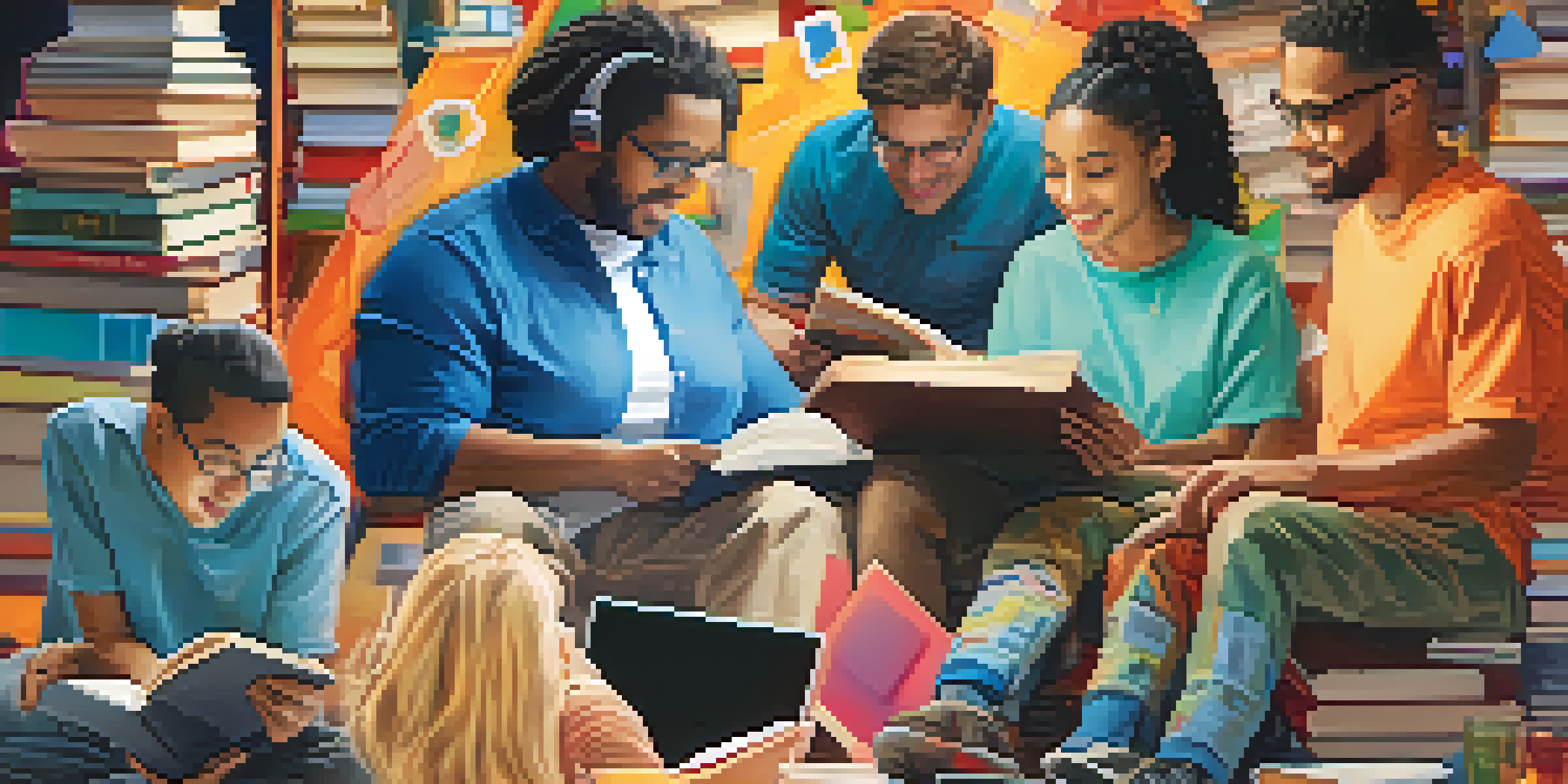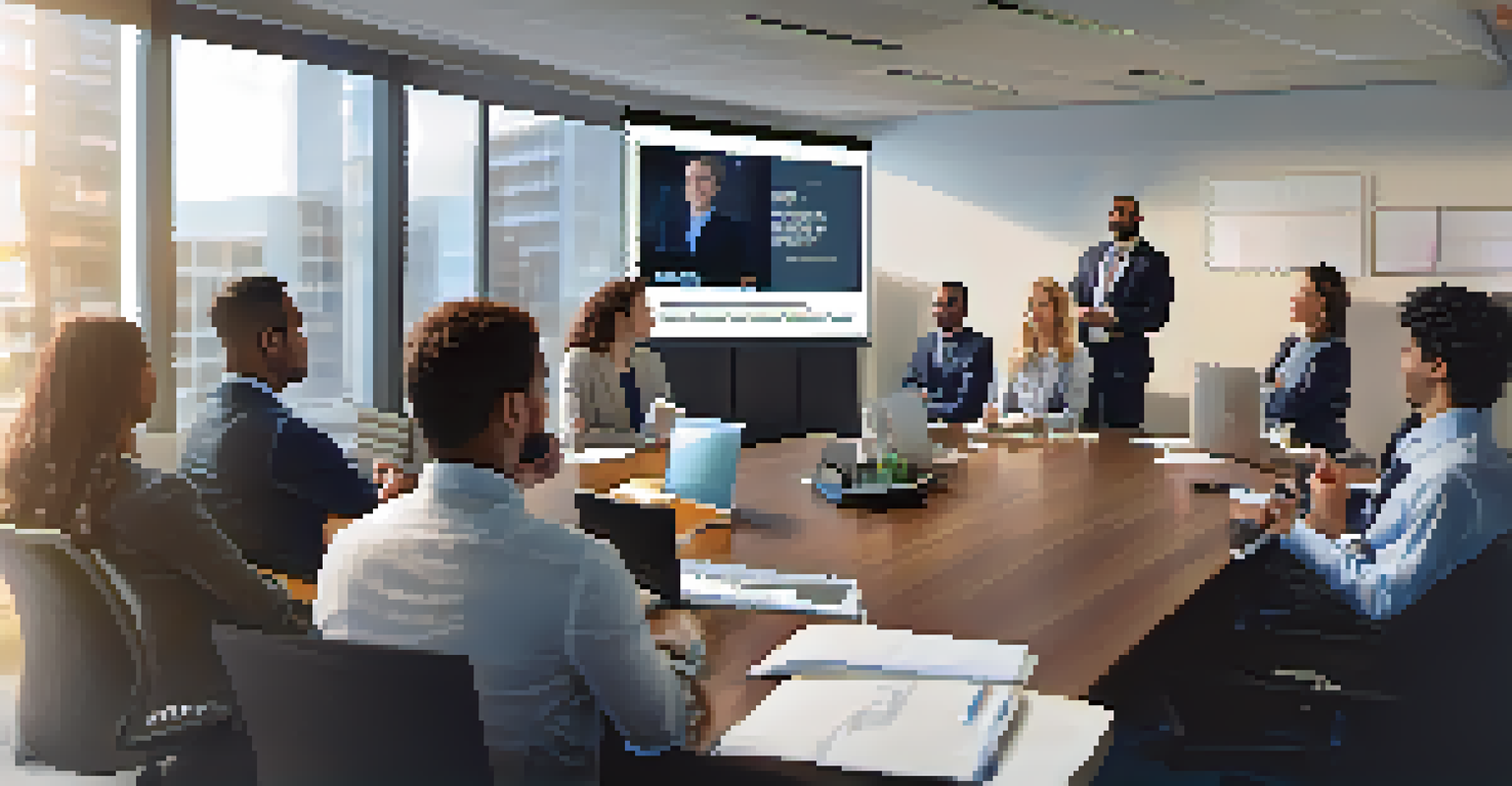How to Use Social Media for Life-long Learning Opportunities

Understanding Lifelong Learning in the Digital Age
Lifelong learning is all about continuously developing your skills and knowledge throughout your life. In today's fast-paced world, this means adapting to new information and technologies as they emerge. Social media platforms provide a unique space where learning can happen informally and organically, making it easier for anyone to engage with new ideas.
Education is the most powerful weapon which you can use to change the world.
Imagine having a library of knowledge right at your fingertips, accessible anytime and anywhere. Social media serves as a dynamic repository of resources, from articles and videos to interactive discussions. This makes learning not just convenient but also engaging, as you can tap into diverse perspectives and experiences from around the globe.
Moreover, lifelong learning through social media encourages you to be an active participant in your education. Instead of passively consuming information, you can interact with others, ask questions, and share your insights, creating a vibrant community of learners.
Choosing the Right Platforms for Learning
Different social media platforms cater to different learning styles and preferences. For instance, LinkedIn is ideal for professional development, offering courses and industry insights. On the other hand, platforms like Instagram and TikTok can provide bite-sized educational content that’s visually engaging and easy to digest.

Consider where your interests lie and which platforms resonate with your learning style. If you enjoy reading, Twitter can be a great place to follow thought leaders and engage with insightful threads. If you prefer video content, YouTube offers a wealth of tutorials and lectures on virtually any topic.
Lifelong Learning via Social Media
Social media provides a dynamic platform for informal and engaging lifelong learning, allowing users to access diverse resources and perspectives easily.
By strategically selecting platforms that align with your learning goals, you can create a more tailored and effective lifelong learning experience. Each platform has its strengths, so exploring a mix can also keep your learning journey fresh and exciting.
Building a Personalized Learning Network
One of the greatest advantages of social media is the ability to connect with like-minded individuals and experts in your field. By following educators, industry leaders, and peers, you can create a personalized learning network that enriches your understanding of various topics. This network can provide support, resources, and encouragement along your learning journey.
The beautiful thing about learning is that no one can take it away from you.
Engagement is key here—don't hesitate to comment on posts, share your own insights, or ask questions. This interaction not only enhances your understanding but also fosters relationships that can lead to collaborative learning opportunities. Consider joining groups or forums within these platforms to deepen your engagement.
Remember, your learning network is a two-way street. By sharing your knowledge and experiences, you contribute to the collective learning of your community, making social media a rich environment for lifelong learning.
Accessing Free Educational Resources Online
Social media is a treasure trove of free educational resources, from online courses to informative webinars. Many organizations and educators share valuable content that you can leverage as part of your learning journey. For example, platforms like Facebook often host groups dedicated to specific topics where members share resources and insights.
Don't overlook hashtags! They can be a powerful way to discover content related to your interests. By following relevant hashtags, you can uncover articles, videos, and discussions that align with your learning objectives. This makes it easier to stay updated on the latest trends and information in your field.
Building Your Learning Network
Creating a personalized learning network on social media connects you with like-minded individuals and experts, enhancing your educational journey through collaboration and support.
By actively seeking out and engaging with these free resources, you can significantly enhance your knowledge without breaking the bank. This accessibility is a key advantage of using social media for lifelong learning.
Participating in Online Courses and Webinars
Many educators and institutions are utilizing social media to promote online courses and webinars. Platforms like LinkedIn and Facebook often feature events where you can sign up for free or low-cost learning opportunities. These events can cover a wide range of topics, providing access to expert knowledge from the comfort of your home.
Engaging in these events not only expands your knowledge but also allows you to interact with instructors and fellow learners. This real-time interaction can deepen your understanding and provide immediate answers to your questions. Plus, you often get access to recorded sessions, allowing you to revisit the material whenever you need.
By taking advantage of these online courses and webinars, you can structure your learning experience effectively, making it easier to fit into your busy schedule while still gaining valuable insights.
Engaging with Educational Content Creators
Social media is home to countless educational content creators who share their expertise on various subjects. Following these creators allows you to receive a steady stream of valuable content directly in your feed. Whether they are bloggers, YouTubers, or podcasters, these individuals often provide unique perspectives and resources to enhance your learning.
Don’t just consume—engage! Leave comments, ask questions, and share your thoughts on their content. This interaction not only helps reinforce your understanding but also fosters a sense of community. Many content creators appreciate feedback and may even tailor their future content based on audience engagement.
Accessing Free Educational Resources
Social media is a rich source of free educational resources, including online courses and webinars, enabling learners to enhance their knowledge without financial barriers.
By actively engaging with educational content creators, you can turn passive consumption into an interactive learning experience that can lead to deeper insights and connections.
Reflecting on Your Learning Journey
Taking the time to reflect on what you’ve learned is crucial for lifelong learning. Social media can facilitate this reflection by providing platforms to share your thoughts and insights with your network. Writing posts about your learning experiences can solidify your understanding and encourage discussions that further enhance your knowledge.
Consider journaling your learning journey on platforms like Medium or even in your personal blog. This not only helps you track your progress but also offers an opportunity to connect with others who might be on similar paths. Sharing your reflections can inspire others to engage in their own learning journeys as well.

In essence, reflection is a powerful tool that transforms knowledge into wisdom. By regularly taking stock of what you’ve learned and sharing it with your community, you can continue to grow in your lifelong learning endeavors.